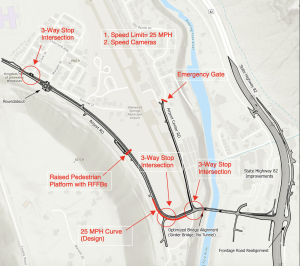Ballot measure 7A sparks debate over early childcare funding

Courtesy/Theresa Hamilton
As voters in Garfield, Pitkin and Eagle counties prepare for the Nov. 4 election, debate continues over ballot measure 7A — a proposal to fund early childhood education through a 0.25% sales tax on nonessential goods.
While opinions differ on how to address the crisis, residents from Parachute to Aspen agree that affordable childcare is in dangerously short supply.
If approved, 7A would create a five-district governing board to manage revenue generated by the new tax. Essential items such as groceries, gas, medicine and diapers would be exempt, according to Strong Start, Bright Future, the campaign in favor of the measure.
Those in favor of the ballot measure argue that the lack of access and astronomical prices of early childcare opportunities warrant a government subsidy, while those opposed argue that adding an additional sales tax isn’t the proper avenue to take and that relaxing regulations could open the door for more affordable childcare options.
According to fall 2024 data from the Confluence Early Childhood Education Coalition, there were only enough licensed slots in the Colorado River Valley to serve 29% of all children under 5 and 40% of young children with all available parents in the labor force. Garfield County fared only slightly better, with capacity for 41% of all children under 5 and 57% of young children with available parents in the labor force.
For infants, the shortage was even starker: In the Roaring Fork and Colorado River valleys, there were only enough licensed slots to serve about 20% of babies born in 2023.
Brenda Kaiser, a volunteer on the 7A campaign’s executive committee, knows the dire situation from a firsthand perspective, and explained how she can’t imagine having to go through a similar situation a decade later with prices at the place they are.
“I moved to Colorado in 2006, and very soon after that became a mom. I didn’t know anybody and I really struggled to find a way to make things work,” she said. Her fluctuating schedule made it difficult to find a reliable babysitter, which resulted in her children accompanying her in the office.
“I know the need, and I know that 18 years after I moved here, everything is much more expensive, so that’s why it was important to me to support 7A.”
Paul Menter, a 15-year member of the Early Childhood Network board, said the region’s high cost of living makes early childhood education a necessity rather than a choice.
“I would love for families that have children to be able to decide economically if they want to send their children to early childhood education, but that’s not the world we live in,” he said. “If you want to have a family in the Roaring Fork Valley, you’re going to have to rely on early childhood education to do so, because both parents are going to have to work.
“Single parents are going to need that help even more, and it’s gotten to the point where living in the Roaring Fork and Colorado River Valley is so expensive that it merits this kind of direct subsidy — both for the parent and provider.”
New Castle resident Gary Kirchberg, who has lived in the area for 37 years, said he recognizes those challenges but believes the solution lies elsewhere.
“It’s the same thing as health care, which costs are just as astronomical,” he said. “The costs are so high because there’s not enough supply.”
He questioned whether tight regulations are discouraging people from opening childcare businesses.
“Perhaps people’s ability to start these kinds of businesses is impossible. Maybe the rules or regulations are so strict that people can’t start these kinds of businesses, and maybe because the supply is so tight, that’s why it’s so costly.”
Retired Garfield Re-2 educator and longtime community member Trish O’Grady agreed with Kirchberg’s point, saying an additional tax would burden residents who already feel overtaxed.
“I’m not against early childhood education at all, and I understand that childcare is expensive — like a lot of things — but I don’t think this is the solution,” O’Grady said. “I’d like to see less regulation and more authorized childcare facilities. That would be more helpful than introducing a new sales tax. I feel we’re being taxed enough in this area.”
Kaiser countered that the proposed funding could have a transformative effect on the local workforce.
“I currently live in Garfield County, but work in Pitkin, because Pitkin County needs workers so badly,” she said. “The ease of access to the benefit will be felt everywhere, and more people will be joining the workforce, which is desperately needed here.”
Menter agreed, noting that because of the valley’s tourism economy, a large share of the tax burden would fall on visitors.
“So much of consumption in the Roaring Fork Valley is exported to people who visit due to tourism,” he said. “It’s the people visiting us who are probably paying 60% of the subsidy.”
While some residents have called for fewer regulations instead of new taxes, Menter said the proposal is really about prioritizing the region’s future.
“This is basically asking voters, ‘Do you believe this is enough of a priority for the future of this valley that it deserves its own dedicated, special-purpose government to serve the entire valley?'” he said. “I think the answer to that is absolutely yes.”
He acknowledged that creating a special-purpose entity could make some voters uneasy but said its focused mission should be viewed as a strength.
“This is a key issue, and it’s not diluted by the multiple priorities that cities and counties have to fund,” Menter said. “From a governance standpoint, it rests outside those other jurisdictional authorities, allowing it to focus solely on early childcare.”
As Election Day approaches, both sides are making their case, but few dispute the urgency of the problem. Across the Western Slope, families continue to face long waitlists, high costs and limited options.
Regardless of how voters decide on 7A, most agree that the region’s childcare crisis can no longer be ignored.

Support Local Journalism

Support Local Journalism
Readers around Glenwood Springs and Garfield County make the Post Independent’s work possible. Your financial contribution supports our efforts to deliver quality, locally relevant journalism.
Now more than ever, your support is critical to help us keep our community informed about the evolving coronavirus pandemic and the impact it is having locally. Every contribution, however large or small, will make a difference.
Each donation will be used exclusively for the development and creation of increased news coverage.









